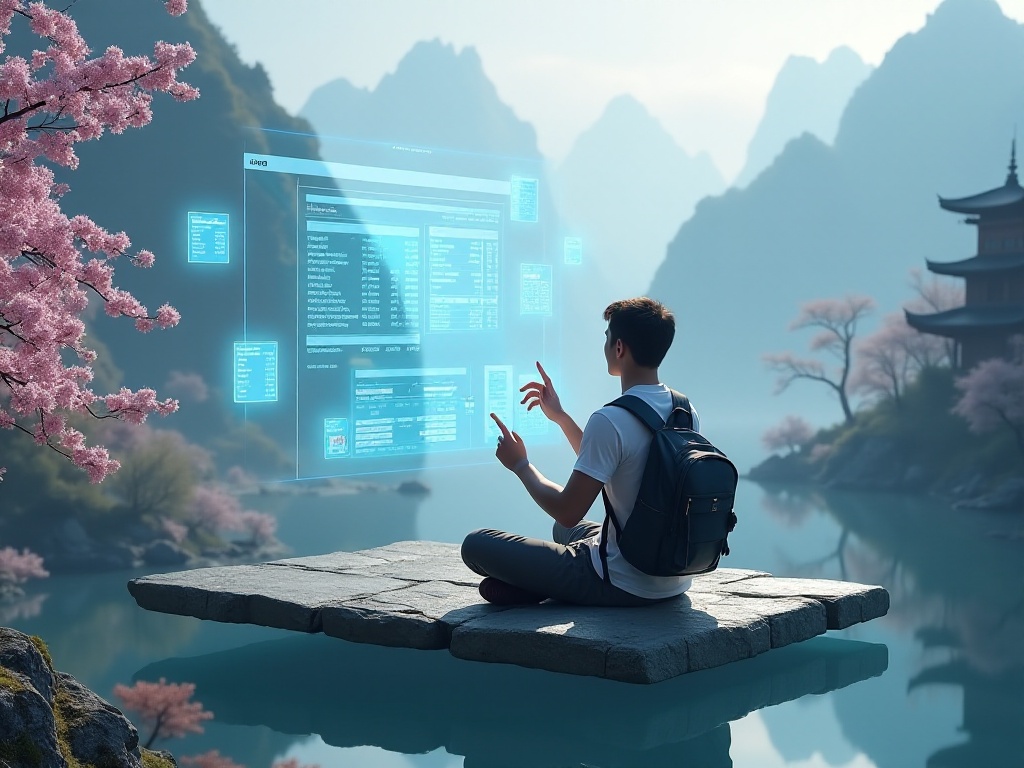Opening Words
Do you feel envious when seeing travel photos in your social media feeds? Some are sunbathing on Bali beaches, others watching sunrise in Cappadocia, Turkey, while you're still worried about travel budgets. As a post-95 travel blogger who has visited over 30 countries, I deeply understand the similar budget concerns many young people have about traveling. Today, let me share my personal experiences about travel budgeting with you.
Fixed Expenses
To be honest, I was also shocked by those major expenses when preparing for my first international trip. I remember when I wanted to go to Japan, I was stunned by the airfare: four to five thousand yuan for economy class during peak season! However, after years of exploration, I discovered that with the right methods, these seemingly scary expenses can actually be reduced quite a bit.
Let's start with transportation costs, which usually account for about one-third of the entire travel budget. Taking Southeast Asia as an example, round-trip flights from Beijing are quite affordable, generally between 2000-3000 yuan. But if you want to go to Europe or America, the budget might need to be multiplied several times. Don't give up though, let me share some money-saving tips.
First, pay attention to airline special fares. Airlines often offer special tickets, especially during off-season. That's how I snagged a bargain ticket to Paris for just 3800 yuan, which was an absolute steal. Second, choose suitable travel times. For example, avoiding peak tourist seasons like summer/winter holidays and Christmas often means much cheaper airfare. Also, learn to compare prices, as different booking platforms can have significant price differences. I usually compare several price comparison apps before deciding where to book.
Accommodation is also a significant expense. But this part is actually very controllable because there are so many choices. Taking Japan as an example, if your budget is sufficient, business hotels in Tokyo typically cost 600-800 yuan per night. But if you want to save money, capsule hotels are definitely a good choice, costing around 200 yuan per night, and the experience is quite unique.
Speaking of capsule hotels, I need to say more. When I first stayed in one, I was worried it might be too cramped or unsafe. But it turned out I was overthinking it - not only was the space utilized very efficiently, but the facilities were also complete, with bathrooms and washing areas being super clean. Plus, staying in capsule hotels makes it especially easy to meet travelers from around the world, and you often hear many interesting stories.
If even capsule hotels seem expensive, youth hostels might be more suitable. I stayed at a hostel in Tokyo that only cost a bit over 100 yuan per night, and it was located near Sensoji Temple, which was super convenient. Of course, you need to be mentally prepared for hostels, as you'll be sharing rooms and might encounter snoring roommates. But honestly, these experiences are part of the fun of traveling.
You can also try guesthouses. Now there are many guesthouse options on major booking platforms, and sometimes if you're lucky, you can book houses with special local characteristics. I once stayed in a machiya in Kyoto, and although it was more expensive than a hostel, experiencing real Japanese life was absolutely amazing.
After settling transportation and accommodation, you need to consider local transportation costs. In Japan, a JR PASS can help you save a lot on Shinkansen fares. In Europe, buying Eurail passes in advance is also a wise choice. During my first trip to Europe, I lacked experience and bought train tickets at the last minute, resulting in painfully expensive prices. Later I learned my lesson, planned routes in advance, bought passes, and saved nearly 2000 yuan just on train tickets.

Daily Expenses
After discussing major expenses, let's talk about those easily overlooked daily expenses. Honestly, many people exceed their travel budget not because of those major expenses, but because of these seemingly minor costs.
Let's start with dining expenses. This really varies by location, and price differences can be huge even within the same city. For example, in Tokyo, consumption levels in Ginza and Akihabara are completely different concepts. A regular bowl of ramen might cost 80-100 yuan in Ginza, but only 50-60 yuan in Akihabara.
I've developed a strategy for saving money on meals without compromising: have breakfast at your accommodation whenever possible, as many hotels provide free breakfast - don't waste it. If your accommodation doesn't provide breakfast, you can buy bread and milk from convenience stores, which is both cheap and convenient. For lunch, I usually choose small restaurants frequented by locals or go to department store food courts. In Japan, lunch sets are often much cheaper than dinner sets, and the portions are sufficient.
I tend to splurge a bit more on dinner since it's the most relaxed mealtime and a good opportunity to enjoy local cuisine. But not every dinner needs to be extravagant - I usually plan 1-2 "luxury meals" during the trip, while keeping other meals affordable.
For example, in Tokyo, I specifically reserve one meal for sushi, while other times I eat at izakayas or ramen shops. In Bangkok, although you can get delicious Tom Yum Kung for 30 yuan at street stalls, I'll also find time to visit a Michelin restaurant to experience refined Thai cuisine.
Activity costs are another easily underestimated part. Many people only consider attraction tickets when planning their trip, but overlook the costs of experience-based activities. Take Turkey for example - just the hot air balloon experience costs over 1200 yuan, and if you add thermal spa and museum tickets, it quickly adds up to thousands.
So I particularly recommend listing all the experiences you want to have before departure and calculating the cost of each item. This not only helps you know what to expect but also helps you understand which activities are worth the money and which ones you can skip. For example, in Turkey, although the hot air balloon is expensive, the experience of watching sunrise from the air is absolutely breathtaking and worth every penny.
Another particularly important point is to learn about local free activities. Many cities' museums have free admission days, and many famous attractions often have free walking tours in their surroundings. In Paris, I discovered that the Louvre is free for everyone on the first Sunday of each month, and people under 26 can also visit for free on Friday evenings.

Smart Planning
When it comes to budget planning, the most important thing is to be realistic and not set the budget too low just to save money. I've seen too many people trying to save money by staying in the cheapest hostels and eating the cheapest fast food, ending up having a very depressing trip. Traveling should be enjoyable, so why make yourself miserable?
I now use the "2-1-1" principle: half of the total budget for fixed expenses, meaning flights and accommodation that must be booked in advance; a quarter for daily expenses, including meals and transportation; and the remaining quarter as contingency funds.
The advantage of this allocation method is that it ensures basic expenses while leaving enough flexibility. After all, you never know what situations you might encounter during travel. You might find a highly-rated restaurant you want to try, or come across an interesting experience you want to participate in. If the budget is too rigid, you might miss out on many wonderful experiences.
In actual execution, I adjust this ratio according to different destinations. For example, in Japan, because transportation and accommodation costs are relatively high, fixed expenses might need to take up 60%; while in Southeast Asia, because the overall consumption level is lower, fixed expenses might only need 40%.
Also, I particularly recommend considering exchange rate fluctuations when planning your budget. I deeply felt this during my trip to Japan last year, because the yen exchange rate was quite volatile, so I deliberately reserved some extra budget. This decision turned out to be very wise, as the yen did appreciate somewhat during the trip. If the budget had been too tight, I might have had to give up some originally planned activities.

Careful Calculation
Speaking of budget execution, I now can't live without expense tracking apps. At first, it seemed troublesome to record every expense. But as I used it more, I found this habit really useful. Many expense tracking apps now support multi-currency recording and can automatically convert to RMB, which is very convenient.
Moreover, through expense tracking, you can clearly see where your money is going. When I first used an expense tracking app, I discovered that my shopping expenses were far more than I imagined. Despite saying before departure that I would only buy necessities, I couldn't stop buying various small items. After discovering this problem, I specifically set a limit for shopping expenses, which prevented overspending on shopping.
Expense tracking apps can also help you analyze the proportion of various expenses. Through this data, you can clearly understand your spending habits, where you can save appropriately, and where it's worth spending more. For example, I found my transportation expenses were particularly high, so I started researching local public transportation systems and tried to take the subway instead of taxis whenever possible, which saved quite a bit of money.
However, even with expense tracking apps, I still recommend leaving a 10%-15% buffer in your budget. Because there will always be unexpected expenses during travel, whether it's seeing a souvenir you really like, suddenly wanting to upgrade your accommodation, or encountering some unexpected situations requiring additional expenses. With this buffer, you won't need to worry too much about these temporary expenses.
When executing the budget, I have another small trick: dividing each day's budget into several envelopes. For example, one envelope for accommodation expenses, one for dining expenses, and one for activity expenses. The advantage of this is that you can visually see how much money is left in each category, avoiding overspending. Of course, now we mostly use electronic payments, but this way of thinking is still very useful.

Long and Short Term
There are big differences in budget planning between short-term and long-term travel. Short-term travel requires more precise planning because with limited time, every day's itinerary needs to be arranged very compactly.
Taking a week-long trip to Japan's Kansai region as an example, airfare is about 3000 yuan, accommodation in business hotels would be around 2800 yuan, local transportation budget 700 yuan (including Kansai Wide Area Pass), dining expenses controlled at 1500 yuan (breakfast at hotel, affordable lunch, and can splurge a bit on dinner), attraction tickets 1000 yuan, plus 1000 yuan shopping budget, totaling about 10,000 yuan. Although this budget isn't particularly low, it can ensure travel quality and allow you to experience everything you want.
Long-term travel, however, requires more "sustainability thinking". Because the time span is long, you must find ways to control expenses to make the budget last longer. I know a global traveler who does this particularly well, managing to control monthly expenses to within 8000 yuan.
His money-saving secrets mainly include: first, choosing off-season travel, when not only are flights and accommodation cheaper, but attractions are also less crowded; second, staying in youth hostels, which not only saves money but also allows you to meet like-minded friends; third, cooking for yourself when possible, which saves money and allows you to experience local life; fourth, using transportation wisely, walking when possible and taking public transportation instead of taxis.
Calculated this way, an annual global travel budget of around 100,000 yuan is sufficient. Although it still sounds like a lot, it's much more realistic than the hundreds of thousands that many people imagine. Moreover, during travel, you can earn travel expenses through various means, such as being a guide for travel agencies or helping others shoot travel videos.
Long-term travel has another advantage: you can understand a place more deeply. Without rushing through itineraries, you can slowly experience the local way of life. For example, I spent a month in Bali, buying fresh fruits and vegetables from local markets every morning, sunbathing and reading on the beach in the afternoon, and having barbecues and chats with hostel friends in the evening. This slow-paced travel style gave me a much deeper understanding of Bali than ordinary tourists.

Final Words
After saying all this, travel budgeting isn't as complicated as imagined. As long as you master the methods, you can definitely plan a nice trip with one month's salary. Those people showing off their travel photos on social media are no different from us, they just took the first step.
So, stop hesitating and start planning your trip! Remember, travel isn't about how far the destination is, the key is taking the first step. Once you actually start traveling, you'll discover that the world is much bigger and more beautiful than imagined. Moreover, through travel, you not only see different scenery, but more importantly, meet different people and hear different stories - these are gains that money cannot measure.
So now, are you ready to start your journey? Let's make travel the most beautiful expectation in life!


